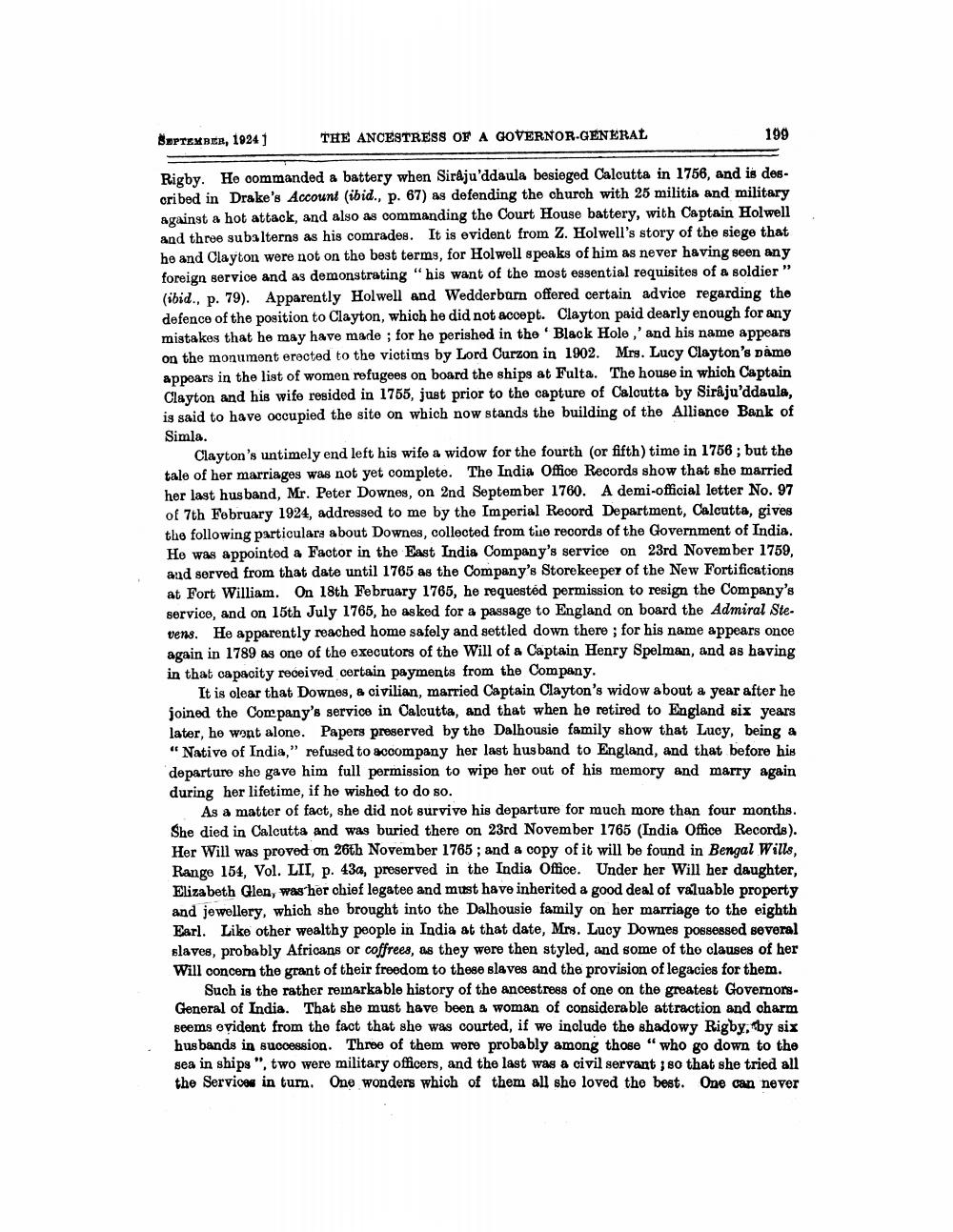________________
SEPTEMBER, 1924 1
THE ANCESTRESS OF A GOVERNOR-GENERAL
199
Rigby. He oommanded a battery when Siraju'ddaula besieged Calcutta in 1756, and is described in Drake's Account (ibid., p. 67) as defending the church with 28 militia and military against a hot attack, and also as commanding the Court House battery, with Captain Holwell and three subalterns as his comrades. It is evident from Z. Holwell's story of the siege that he and Clayton were not on the best terms, for Holwell speaks of him as never having seen any foreign service and as demonstrating "his want of the most essential requisites of a soldier" (ibid., p. 79). Apparently Holwell and Wedderburn offered certain advice regarding the defence of the position to Clayton, which he did not accept. Clayton paid dearly enough for any mistakes that he may have made ; for he perished in the Black Hole ,' and his name appears on the monument erected to the victims by Lord Curzon in 1902. Mrs. Lucy Clayton's påme appears in the list of women refugees on board the ships at Fulta. The house in which Captain Clayton and his wife resided in 1755, just prior to the capture of Calcutta by Siraju'ddaula, is said to have occupied the site on which now stands the building of the Alliance Bank of Simla.
Clayton's untimely end left his wife a widow for the fourth (or fifth) time in 1756 ; but the tale of her marriages was not yet complete. The India Office Records show that she married her last husband, Mr. Peter Downes, on 2nd September 1760. A demi-official letter No. 97 of 7th February 1924, addressed to me by the Imperial Record Department, Calcutta, gives the following particulars about Downes, collected from the records of the Government of India. He was appointed a Factor in the East India Company's service on 23rd November 1759. and served from that date until 1765 as the Company's Storekeeper of the New Fortifications at Fort William. On 18th February 1765, he requestéd permission to resign the Company's service, and on 15th July 1765, he asked for a passage to England on board the Admiral Ste. vens. He apparently reached home safely and settled down there ; for his name appears once again in 1789 as one of the executors of the Will of a Captain Henry Spelman, and as having in that capacity received certain payments from the Company.
It is olear that Downes, & civilian, married Captain Clayton's widow about a year after he joined the Company's service in Calcutta, and that when he retired to England six years later, he wont alone. Papers preserved by the Dalhousie family show that Lucy, being a "Native of India," refused to accompany her last husband to England, and that before his departure she gave him full permission to wipe her out of his memory and marry again during her lifetime, if he wished to do so.
As a matter of fact, she did not survive his departure for much more than four months. She died in Caloutta and was buried there on 23rd November 1765 (India Office Records). Her Will was proved on 26th November 1765; and a copy of it will be found in Bengal Wills, Rango 154, Vol. LII, p. 43a, preserved in the India Office. Under her Will her daughter, Elizabeth Glen, was her chief legatee and must have inherited a good deal of valuable property and jewellery, which she brought into the Dalhousie family on her marriage to the eighth Earl. Like other wealthy people in India at that date, Mrs. Luoy Downes possessed several slaves, probably Africans or coffrees, as they were then styled, and some of tho clauses of her Will concern the grant of their freedom to these slaves and the provision of legacies for them.
Such is the rather remarkable history of the ancestress of one on the greatest Governors. General of India. That she must have been a woman of considerable attraction and charm seems evident from the fact that she was courted, if we include the shadowy Rigby, by six husbands in succession. Three of them were probably among those "who go down to the sea in ships", two were military officers, and the last was a civil servant ; so that she tried all the Services in tum. One wonders which of them all she loved the best. One can never




